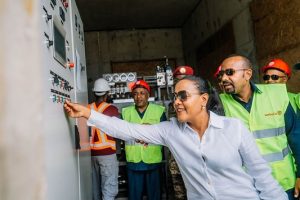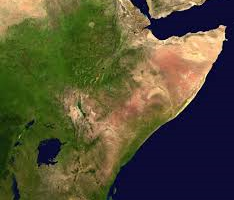
As the world continues to evolve, the relationship between Africa and the United States has become an increasingly important focus on the global stage. In recent years, a concerted effort has been to deepen cooperation and strengthen ties between the world’s fastest-growing continent and Washington.
As the continent of Africa continues its rapid economic and social development, the strategic importance of its partnership with the US has come into sharper focus. Nowhere is this more evident than in the realms of security, trade, investment and development ties.
Africa’s GDP is projected to reach 6.7 trillion dollars by 2030, up from 2.6 trillion dollars in 2020. Meanwhile, the continent’s population is expected to double to 2.5 billion people by 2050. This explosive growth has captured the attention of US policymakers, who are working to position American companies and interests to benefit.
The renewed African Growth and Opportunity Act (AGOA), provides duty-free access to the US market for thousands of products from eligible African countries. Since its inception in 2000, AGOA has helped drive a five-fold increase in US-Africa trade, reaching 74 billion dollars in 2022.
AGOA first signed into law by President Clinton in 2000, continues to play a crucial role in strengthening the economic ties between Africa and the United States. As we approach AGOA’s 24th anniversary, it’s clear that this landmark trade agreement has had a transformative impact on the continent.
AGOA provides duty-free access to the U.S. market for thousands of products from eligible sub-Saharan African countries, making it easier for African businesses to export their goods to the lucrative American market. This preferential trade treatment has been a game-changer, opening up new avenues for economic growth and development across the continent. It has enabled African countries to move beyond the export of raw materials and capitalize on their manufacturing capabilities, creating much-needed jobs and income for their populations.
The statistics reflect AGOA’s success. Since its inception, two-way trade between the U.S. and sub-Saharan Africa has more than doubled, reaching 100 billion dollars in 2023. Moreover, AGOA-eligible countries have seen a significant increase in their exports to the U.S., with textiles, apparel, and agricultural products being some of the biggest success stories.
But AGOA’s importance goes beyond just trade and economic cooperation. It has also served as a platform for deeper political and diplomatic engagement between the African U.S. Regular AGOA forums and high-level dialogues have provided opportunities for leaders from both sides to discuss issues ranging from regional security to climate change and good governance. AGOA has helped to elevate Africa’s voice on the global stage and fostered a more balanced, mutually beneficial relationship between the U.S. and the continent.
As the world navigates an increasingly complex geopolitical landscape, the continued success of AGOA will be crucial in maintaining and strengthening the Africa-U.S. partnership. With the agreement set to expire in 2025, policymakers in both countries will need to work together to ensure its renewal and expansion, solidifying this vital economic and diplomatic link for years to come.
Regarding, security cooperation has also emerged as a key pillar of the Africa- US relationship. American military and intelligence assets play a vital role in combating terrorism, piracy, and other threats across the continent. At the same time, the US has ramped up efforts to build the capacity of African security forces through training, equipment, and joint exercises. It is estimated that the US established around 29 military bases across the African continent.
In a recent webinar hosted by the Africa Regional Media Hub, U.S. Marine Corps General Michael Langley, Commander of U.S. Africa Command (AFRICOM), provided an update on the evolving security landscape in Africa and the ongoing efforts to foster stability through strengthened partnerships.
General Langley emphasized the critical role of U.S.-Africa cooperation, stating, “With our common challenges, we address those issues which are African-led and U.S.-enabled.” This whole-of-government approach has been central to AFRICOM’s strategy, as the command seeks to bolster the capacity of African partners to deter threats and respond to crises.
The general pointed to the successful mission against ISIS-Somalia’s Bilal al-Sudani earlier this year as an example of the command’s vigilance in countering terrorist threats. However, he acknowledged the security challenges posed by the withdrawal of French and U.S. troops from the Sahel region, stating that the area “has become less safe” due to the expansion of violent extremist groups.
To address this challenge, AFRICOM is working closely with African nations to identify their specific needs and support enduring, locally-led solutions. “Our way forward is to engage with these countries, identify what their needs are in which they will lead an enduring solution, and in most cases it will be a whole-of-government approach on their end as well,” General Langley explained.
A similar dynamic is unfolding in Somalia, where the transition from the African Union Transition Mission in Somalia (ATMIS) to the Somali National Army poses potential risks. General Langley acknowledged the concerns, stating, “Any transition is challenging, but they’re meeting that with solutions and building out their Somali National Army.”
The Somali government has assured AFRICOM that the ATMIS withdrawal will be measured and phased, allowing the Somali forces to gradually assume control of security responsibilities. President Hassan Sheikh Mohamud emphasised the importance of a whole-of-government approach, from security operations to service provision and human rights protections, to counter the threat posed by al-Shabaab.
The AFRICOM commander’s remarks underscored the importance of the U.S.- Africa defence partnership in addressing the continent’s complex security landscape. As the United States continues to strengthen its ties with African nations, the shared objectives of stability, security, and prosperity will remain at the forefront of this evolving strategic relationship.
The longstanding relationship between Africa and the US spans over a century, extending beyond economic and security cooperation. Washington has provided aid to African nations facing various challenges. However, in recent years, some African countries have seen a decline in their relations with the US. This shift may be attributed to the rise of a multipolar world, prompting these nations to explore alternatives beyond relying solely on the US, especially with China and Russia showing increased interest in Africa.
BY EYUEL KIFLU
THE ETHIOPIAN HERALD THURSDAY 11 JULY 2024





